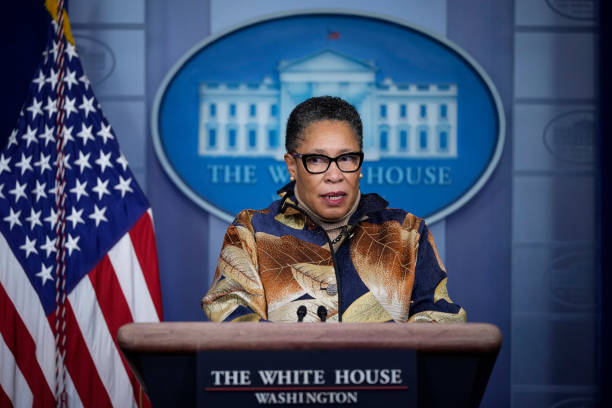(ThyBlackMan.com) During this Women’s History Month, the Honorable Marcia Louise Fudge announced that she will be only the second of President Biden’s original cabinet members to resign from her position. Her last day of work is March 22. Marcia Fudge has spent decades in public service as mayor of her hometown, Warrenton, Ohio, and representative of Ohio’s 11th Congressional District from 2008 through 2021. She also served as President of Delta Sigma Theta Sorority, Inc., the mighty and influential Black women’s sorority (of which I am a member) founded in 1913.

Fudge’s tenure as the 18th Secretary of the Department of Housing and Urban Development was marked by her passionate advocacy for the unhoused. She worked to provide them with direct housing assistance. Concerned about the wealth gap and Black economic equity, she also expanded homeownership opportunities and focused on eliminating discrimination in housing. Acutely aware of climate change’s challenges, she worked on building climate-resilient communities.
Thanks to Fudge and her team, the level of first-time homeownership is the highest in two decades, despite the challenges of high interest rates and mortgages. Under her leadership, HUD has also provided unprecedented resources for tenant assistance and tenant education. HUD worked on the Renter’s Bill of Rights and increased funding for an Eviction Protection Grant.
All in all, Fudge has had an effective term as HUD Secretary. Why is she leaving? She says she has done all she can and wants to spend more time with her family, especially her 92-year-old mother. While she didn’t say it, I can see why this is a good time to go. In this toxic political environment, Congress would have difficulty allowing President Biden to pass gas, much less legislation. Until the 2024 election, progressive legislative efforts are in limbo.
The Department of Housing and Urban Development was created in 1965 to consolidate five government agencies: the Federal Housing Administration, the Public Housing Administration, The Federal National Mortgage Association (Fannie Mae), the Urban Renewal Administration, and the Community Facilities Association. HUD has made a tremendous difference in Black lives, both positively and negatively. Its redlining policies excluded Black people from ownership for decades, and more recently, its aggressive focus on increasing homeownership has included efforts to increase Black ownership.
Robert C. Weaver, a Harvard-educated African American economist, was the first HUD Secretary appointed by President Lyndon B. Johnson. He was the first African American appointed to a Cabinet position. Patricia Roberts Harris was the first African American woman to serve as a Cabinet Secretary, as Secretary of HUD (1977-1979), then as Secretary of the Department of Health and Human Services (1979-1981). There have been other notable Secretaries of HUD; interestingly, a plurality of them have been women or people of color, including Carla Hills ((1975-88). Samuel Pierce (1981-1989), Alphonso Jackson (2004-2008), Julian Castro (2014-2017), and Ben Carson (2017-2021). One of my faves was Jack Kemp, a white man who “got” equity issues and focused on ways to address them.
Only a few Black women have served as Constitutional Cabinet secretaries, as in those who are in the line of succession for President based on the time their department was established, according to the Presidential Succession Act of 1947. With that law, Secretary Fudge would have been 13th in the line of succession to the Presidency, after the Senate Majority Leader, House Speaker, and other cabinet secretaries. Other Black women have been in the line of succession, including Hazel O’Leary (1993-1997), the Secretary of Energy who ably raised energy issues to African Americans, Alexis Herman, the extraordinary Secretary of Labor (1997-2001) whose “ride or die” advocacy for workers also lifted national awareness of her powerful sorority when the crimson and cream showed out for her confirmation hearings. Condoleeza Rice was Secretary of State between 2005 and 2009, but a powerful and forceful international player who lent gravitas to the flawed Bush Administration. As Attorney General, Loretta Lynch (2015-2017) ran with the baton she picked up from Eric Holder. She made it clear that she meant business.
Only eight Black women have had Constitutional cabinet appointments to succeed the President. Each of them, including Marcia Fudge, stands on the shoulders of Patricia Robert Harris, who held two cabinet positions. Our scarcity in these positions speaks to our general sidelining in the policy space. Things are better than they once were—we only got the first Black woman cabinet member in 1977. But our absence in these policy positions is glaring.
Other Black women have had “Cabinet Level” status, as conferred by the President. They include Lisa Jackson, who led the Environmental Protection Agency; Susan Rice (2009-2013); Linda Thomas Greenfield (2021-), Ambassadors to the United Nations; and Sholanda Young (2022-)at the Office of Management and Budget. While the presence of Black women in these elite policy roles is increasing, it is insufficient.
In this Women’s History Month, we applaud Secretary Marica Fudge for a job well done and mourn the scarcity of Black women in the highest levels of government. President Biden has done better than most, but there is so much more to be done!
Written by Julianne Malveaux
Official website; https://www.juliannemalveaux.com

















Leave a Reply